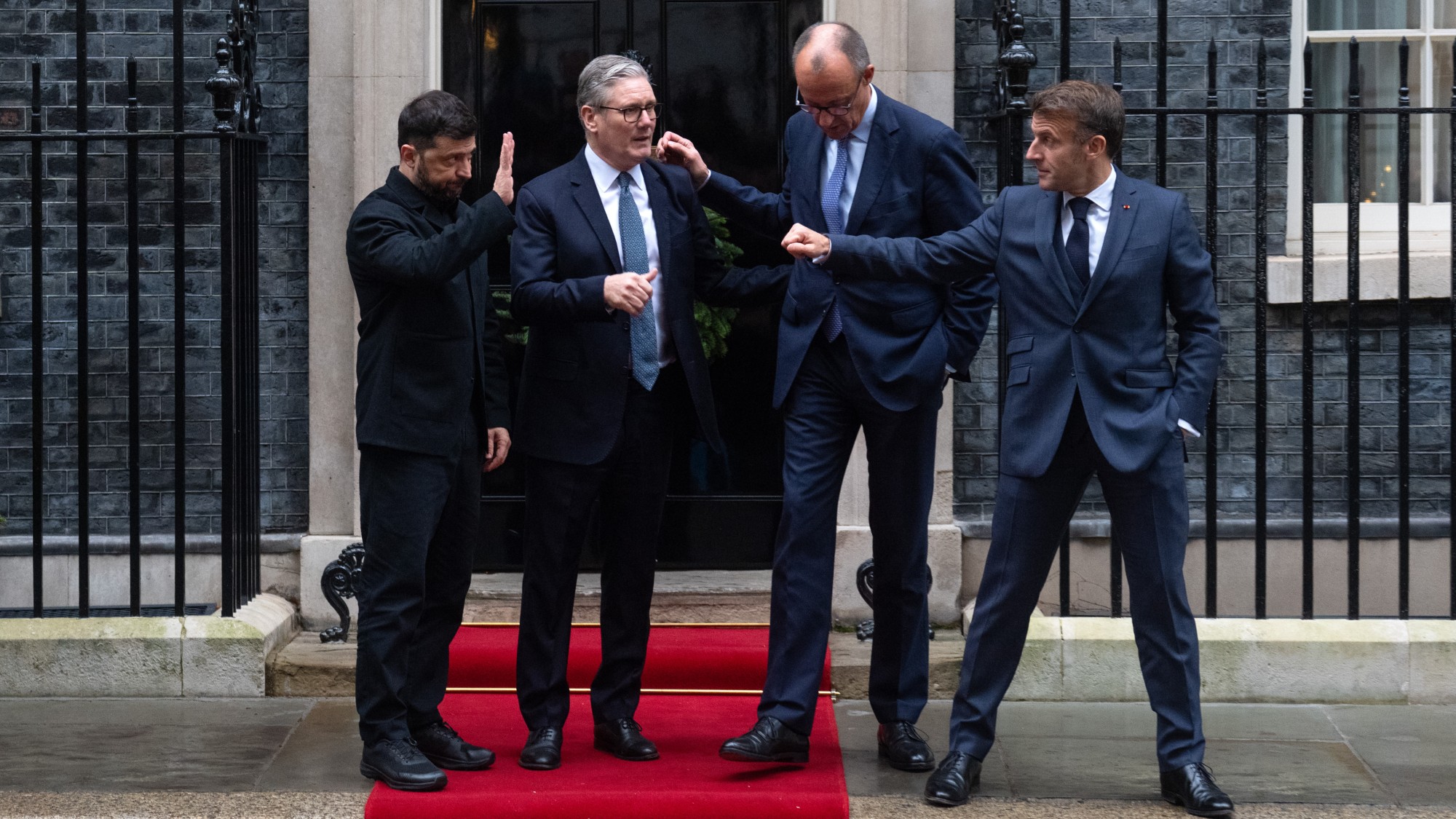A 'nuclear timebomb': tensions rise over Ukraine power plant
Greenpeace accuses Vladimir Putin of threatening an 'unprecedented escalation' of war

A free daily email with the biggest news stories of the day – and the best features from TheWeek.com
You are now subscribed
Your newsletter sign-up was successful
The UN's nuclear watchdog has demanded that Russia withdraw its forces from Ukraine's Zaporizhzhia nuclear power plant two years after it captured the facility.
Greenpeace described the occupied plant as a "nuclear timebomb" and accused Vladimir Putin of threatening an "unprecedented escalation" if the Russian president orders the reactors to be restarted.
Ukraine is haunted by the legacy of the Chernobyl nuclear disaster of 1986, so tensions and fears over Moscow's intentions are high.
The Week
Escape your echo chamber. Get the facts behind the news, plus analysis from multiple perspectives.

Sign up for The Week's Free Newsletters
From our morning news briefing to a weekly Good News Newsletter, get the best of The Week delivered directly to your inbox.
From our morning news briefing to a weekly Good News Newsletter, get the best of The Week delivered directly to your inbox.
A power plant on the frontline
The plant is located on the Dnipro River in eastern Ukraine and Ukrainian forces occupy the bank opposite, leaving it "in the sights of both sides' militaries", said The Guardian. Ukraine and Russia have blamed each other for shelling that has downed power lines.
"Captured by the Russian invaders" in the early stages of the war in March 2022, the "vast" Zaporizhzhia nuclear plant has been "on the frontline of the war ever since", added the paper. All six of its reactors are shut down, but it still needs "constant power" to keep fuel in those reactors cool and prevent a "potentially catastrophic meltdown", said Reuters.
Russia initially wanted to connect the reactors to its own energy grid but that plan was abandoned, said The Guardian. "But recent comments from officials have suggested a new attempt to restart nuclear energy generation may take place later this year."
In December, Yuriy Chernichuk, the Russian-appointed director of the site, told the plant's staff newsletter that 2024 is an "anniversary year for the station and the station is determined to work at full capacity".
A free daily email with the biggest news stories of the day – and the best features from TheWeek.com
But Rafael Grossi, head of the International Atomic Energy Agency (IAEA), warned that "any such action would require a number of considerations", including that it is "an active combat zone" and that "this plant has been in shutdown for a prolonged period of time", said The Straits Times.
Shaun Burnie, a nuclear specialist with Greenpeace Germany, said that "no nuclear regulations exist anywhere in the world that permit a nuclear plant to operate on the frontline in an active war zone".
The pressure group also said that there was concern over whether Rosatom, the Russian state-owned energy provider now running the plant, could ensure there was enough cooling water available to safely operate even a single reactor.
In the IAEA's fourth resolution condemning Russia's actions against Ukrainian nuclear facilities, it called for the "urgent withdrawal of all unauthorized military and other unauthorized personnel" and for the plant to be "immediately returned to the full control of the competent Ukrainian authorities".
Overseeing a Russian 'nuclear timebomb'
There are no signs of Russia adhering to the request, but in a meeting with Grossi earlier this month, Putin did acknowledge that "it is very important, on a planetary scale" to ensure "nuclear energy safety and compliance with safety standards throughout the world". The talks between the two men were described as "tense" by the RIA Novosti news agency, but a spokesperson for the IAEA denied the description.
Greenpeace accused Grossi of complacency, and insisted restarting any of the reactors should be comprehensively ruled out. The IAEA "must not play the role of pretend regulator" in "overseeing a Russian nuclear timebomb", said a spokesperson, but instead "must make clear that safe operation is impossible".
Over the past 18 months the plant has been cut off from external power eight times, forcing it to rely on diesel generators, said Reuters, so safety there "remains precarious".
Chas Newkey-Burden has been part of The Week Digital team for more than a decade and a journalist for 25 years, starting out on the irreverent football weekly 90 Minutes, before moving to lifestyle magazines Loaded and Attitude. He was a columnist for The Big Issue and landed a world exclusive with David Beckham that became the weekly magazine’s bestselling issue. He now writes regularly for The Guardian, The Telegraph, The Independent, Metro, FourFourTwo and the i new site. He is also the author of a number of non-fiction books.
-
 Buddhist monks’ US walk for peace
Buddhist monks’ US walk for peaceUnder the Radar Crowds have turned out on the roads from California to Washington and ‘millions are finding hope in their journey’
-
 American universities are losing ground to their foreign counterparts
American universities are losing ground to their foreign counterpartsThe Explainer While Harvard is still near the top, other colleges have slipped
-
 How to navigate dating apps to find ‘the one’
How to navigate dating apps to find ‘the one’The Week Recommends Put an end to endless swiping and make real romantic connections
-
 Trump’s ‘Board of Peace’ comes into confounding focus
Trump’s ‘Board of Peace’ comes into confounding focusIn the Spotlight What began as a plan to redevelop the Gaza Strip is quickly emerging as a new lever of global power for a president intent on upending the standing world order
-
 Trump considers giving Ukraine a security guarantee
Trump considers giving Ukraine a security guaranteeTalking Points Zelenskyy says it is a requirement for peace. Will Putin go along?
-
 Vance’s ‘next move will reveal whether the conservative movement can move past Trump’
Vance’s ‘next move will reveal whether the conservative movement can move past Trump’Instant Opinion Opinion, comment and editorials of the day
-
 What have Trump’s Mar-a-Lago summits achieved?
What have Trump’s Mar-a-Lago summits achieved?Today’s big question Zelenskyy and Netanyahu meet the president in his Palm Beach ‘Winter White House’
-
 Why, really, is Trump going after Venezuela?
Why, really, is Trump going after Venezuela?Talking Points It might be oil, rare minerals or Putin
-
 Who is paying for Europe’s €90bn Ukraine loan?
Who is paying for Europe’s €90bn Ukraine loan?Today’s Big Question Kyiv secures crucial funding but the EU ‘blinked’ at the chance to strike a bold blow against Russia
-
 Will there be peace before Christmas in Ukraine?
Will there be peace before Christmas in Ukraine?Today's Big Question Discussions over the weekend could see a unified set of proposals from EU, UK and US to present to Moscow
-
 Moscow cheers Trump’s new ‘America First’ strategy
Moscow cheers Trump’s new ‘America First’ strategyspeed read The president’s national security strategy seeks ‘strategic stability’ with Russia